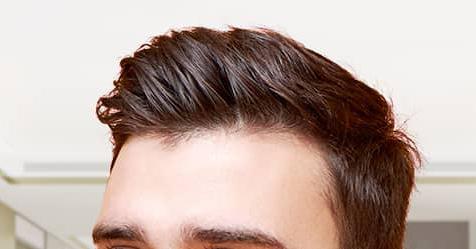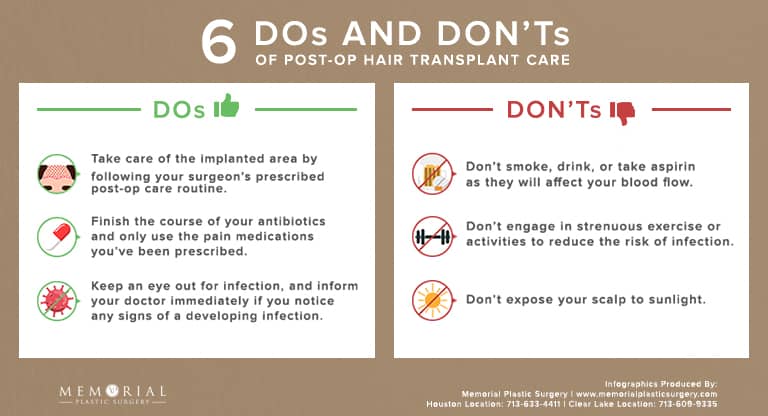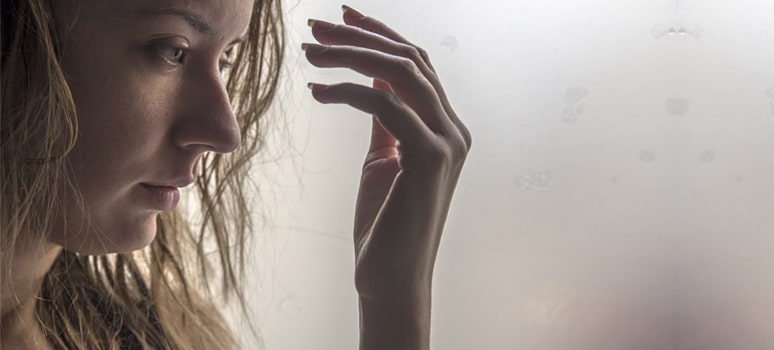6 Dos & Don’ts of Hair Transplant Post-Op Care
The days and weeks after the procedure are the most crucial for your recovery. Because it is such a delicate procedure, postoperative care requires you to follow certain precautions after hair transplant surgery. What you do (and don’t do) during this time will determine the results you obtain once fully recovered.
While most patients can return to their everyday routines within a day or two after surgery, it’s best to be patient and gradually transition back to doing work and other activities.
For effective hair transplant aftercare, we recommend the following dos and don’ts for you.

Interested in Hair Transplant?
Here at Memorial Plastic Surgery, we offer FUE Hair Transplant to patients who want to restore their thinning hair that is usually associated with female & male baldness.
What Should You Do After Hair Transplant Surgery?

Here’s a list of three things you can do after an FUE hair transplant:
1. DO take care of the implanted area
Your hair transplant recovery heavily depends on how well you care for the implanted area within the first seven days after hair transplant. Post-surgery, your doctor will give you a saline solution with copper peptides that you must spray on the transplanted area. On your own, or with the help of someone, spray the solution every 2-3 hours or as directed by your surgeon to avoid swelling.
You may be allowed to wash your hair 24 hours after the surgery, but water pressure must be kept to a minimum, and its temperature must be lukewarm. To manage it easier, you can use a small jar to wash the location of the transplanted roots. Refrain from putting anything on your scalp or using any products that your doctor hasn’t cleared as it may irritate the area.
Once you’ve finished, lightly dab the area with a soft cloth to dry.
You should expect itchiness, especially as the scabs begin to form. But it’s imperative to avoid directly touching the area with your fingers as this may cause bleeding or inflammation. You can also consult your doctor on properly removing scabs after a hair transplant without affecting the newly-placed grafts.
2. DO use pain medication as recommended
It’s normal to experience swelling, headaches, or discoloration of the transplanted area within the first week. It is essential to take your antibiotics as prescribed to help prevent infection. Painkillers and even sleeping pills when you can’t sleep will help relax your body and give you relief.
3. DO keep an eye out for infection
Surgical incisions are at risk for infection, which is why unless there’s an absolute need to, avoid touching the donor area with your hands. You’ll also be responsible for keeping your wound dry and changing its dressing.
Always be on the lookout for discharge, pus, excessive bleeding, fever, persistent pain, or increased redness of your scalp. These are signs of a developing infection that needs immediate attention from your doctor.

Recommended Article:
Understanding Early Female Hair Loss: Why it Happens and How You Can Correct It
In this article, we discussed the causes for the early female hair loss and what you can do to correct this.
What Should You Not Do After Hair Transplant Surgery?
Even if you feel strong enough after a few days, there are still several things to avoid so that you do not derail your healing. Take note of these three crucial don’ts!
1. DON’T smoke, drink or take aspirin
Alcohol in the body interferes with its metabolism, which is crucial for the growth of new hair. Taking aspirin in lieu of what you’ve been prescribed may thin the blood and cause excessive bleeding. It’s better to stick with the pain medication you’ve been given.
Nicotine from cigarettes restricts blood flow. We advise our patients to avoid cigarettes at least four weeks before surgery.
2. DON’T engage in strenuous exercise or activities
Workouts that require too much exertion, lifting, or straining may disrupt the healing of your wound. You need to manage your blood pressure and heart rate to lessen the risk of swelling, so avoid excessive movements, especially during the first two weeks post-op. Too much movement may also cause excessive sweating, and perspiration increases the risks of infection.
3. DON’T expose your scalp to sunlight
Direct exposure to sunlight can be dangerous to the areas where grafts have been implanted. It is advisable to avoid exposure for at least four months following the FUE hair transplant procedure. But if sun exposure is entirely unavoidable, you must carefully apply sunscreen to the area before heading out. Some patients prefer to use hats to protect themselves from the sun, but there is still a risk of rubbing against the implanted hairs, which is why we don’t recommend it.
More Aftercare Tips
Two important aftercare activities that you will be doing every day are washing your hair and sleeping in a manner that doesn’t affect your surgery. Here is how you can wash your hair and sleep in the optimal position post-FUE hair transplant.
How to Wash Your Hair After FUE Hair Transplant

An incorrect approach to hair washing can damage your hair follicles and adversely affect the outcome of your surgery. Any solid contact for the scalp, such as rubbing or contact with fingernails, should be avoided when washing your hair. Here are four steps you can follow:
- Apply a moisturizer in the transplanted area and leave it on for 15-30 minutes.
- Wash your scalp with warm water.
- Then, apply a small amount of shampoo and lather carefully.
- After washing, pat your hair dry with a soft cloth.
How to Sleep After FUE Hair Transplant

During the first week after treatment, sleeping in an elevated position is crucial. Applying pressure to the transplanted area may cause infection, so we recommend sleeping at least at a 45-degree angle. You should lie on your back, as sleeping on your stomach could damage the transplanted hair.
We also recommend placing a pillow between your head and the headboard to avoid any untoward bumping incidents. Some patients choose to stay on a recliner to prevent this, as it keeps them from tossing and turning or rubbing their hairline against pillows.
What to Look for in a Hair Transplant Surgeon
To know if you are a good surgical candidate, your lifestyle and physical condition are fit. Your doctor will be the one to make all the treatment recommendations. You will also go through a thorough examination such as a density check and a scalp laxity assessment.
You want to work with a doctor who can provide you with a long-term plan. They’ll be able to consider how the procedure performed will affect your future.
To know if you are a good candidate for FUE Hair Transplant surgery, contact our team of board-certified doctors today for a consultation.
*This blog is created and maintained for informational purposes only. The images present may not accurately reflect actual cases per individual. Individual cases are unique, and the descriptions and solutions will vary per patient.
